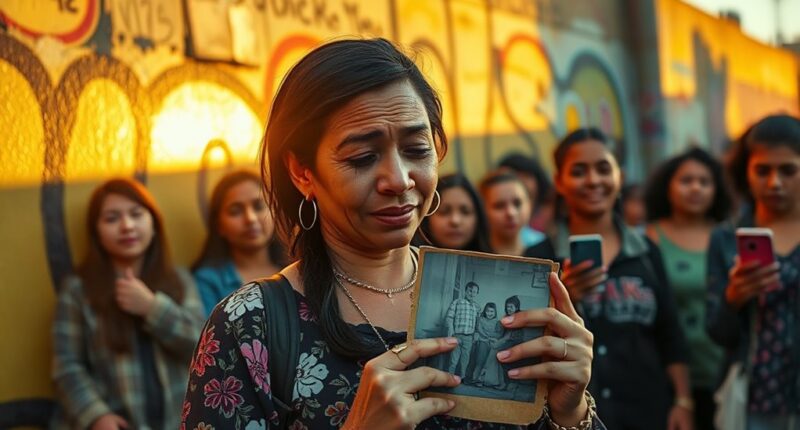Stories of resilience after deportation go viral on TikTok because they share raw honesty, inspiring hope and humanizing those affected. These videos often show individuals overcoming immense challenges, using symbols like portable gear to illustrate adaptability and strength. They challenge stereotypes and remind viewers of the power of community and determination. If you want to explore how these stories motivate and create solidarity, keep exploring these powerful narratives of endurance and hope.
Key Takeaways
- Personal stories share raw emotions, highlighting pain, separation, and hope to foster viewer connection and understanding.
- Content emphasizes resilience through rebuilding lives, learning new skills, and finding community support.
- Viral videos inspire others by turning hardship into messages of hope, sparking collective solidarity.
- Stories humanize deported individuals, challenging stereotypes and showcasing their strength and aspirations.
- Use of symbols like portable camping gear represents adaptability, resourcefulness, and the collective human spirit in adversity.

When people face deportation, it can feel like their world is falling apart. You might feel overwhelmed, lost, and unsure of what comes next. But amid these intense emotions, some find a new voice—one that’s powerful enough to inspire others. On TikTok, stories of resilience after deportation are going viral, showing that even in the darkest moments, hope can shine through. You see videos where individuals share their journeys, not just of loss, but of strength and rebuilding. These stories often start with raw honesty—people opening up about the pain of separation from loved ones, the fears of starting over in an unfamiliar place, and the resilience that keeps them going. You notice that many creators emphasize their ability to adapt, to find community, and to redefine themselves beyond their deportation.
What makes these stories resonate isn’t just the hardship, but the courage displayed. You watch as individuals turn their experiences into messages of hope for others facing similar struggles. They share how they’ve learned new skills, started small businesses, or connected with support groups that help them navigate their new realities. Their openness sparks a sense of solidarity among viewers who may be feeling isolated or powerless. These TikTok videos often feature uplifting moments—smiles, reunions, small victories—that remind you resilience isn’t about never falling, but about rising each time you do. Additionally, the stories highlight how portable camping gear can provide comfort and independence in unfamiliar environments, symbolizing adaptability and resourcefulness.
You also see how these stories challenge stereotypes and humanize those affected by deportation. Instead of being defined solely by their legal status, they’re seen as survivors, dreamers, and fighters. Their stories become a source of inspiration, showing that even when circumstances seem impossible, strength and perseverance can lead to new beginnings. By sharing their journeys, they motivate others to stay hopeful and to keep fighting for a better future. As these stories go viral, they create a ripple effect—showing that resilience isn’t just individual but collective, a testament to the enduring human spirit in the face of adversity.
Frequently Asked Questions
How Do Tiktok Creators Ensure Their Safety When Sharing Sensitive Stories?
You protect your safety by avoiding sharing overly personal information, such as exact locations or full names. Use pseudonyms or generic details to maintain anonymity. Enable privacy settings to control who views your content, and consider turning off comments or disabling duets if needed. Stay aware of your surroundings when recording, and trust your instincts—if something feels unsafe, it’s okay to hold back or seek support before posting.
What Support Networks Exist for Deported Individuals Featured on Tiktok?
Like Icarus seeking safe wings, deported individuals on TikTok find support through community organizations and online groups. You can connect with nonprofits such as the American Immigration Council or local immigrant support centers that offer legal aid, counseling, and advocacy. These networks help you navigate complex challenges, share stories safely, and find solidarity. Remember, you’re not alone—there’s strength in community, just as heroes find strength in their alliances.
How Do Viewers Typically Respond to Stories of Resilience on Tiktok?
You often see viewers respond with empathy and inspiration when they watch stories of resilience on TikTok. Many leave supportive comments, share these videos to raise awareness, or express admiration for the individuals’ strength. Some viewers feel a sense of solidarity, recognizing shared struggles or inspiring hope in their own lives. Overall, these stories tend to foster a compassionate community that celebrates perseverance despite hardships.
Are There Legal Risks for Sharing Deportation Stories Publicly?
Yes, there are legal risks when sharing deportation stories publicly. You might unintentionally reveal sensitive information that could impact your safety or violate privacy laws. If you discuss someone else’s case without their consent, you could face legal repercussions. To protect yourself, avoid sharing identifying details, and consider consulting a legal expert beforehand. Be cautious about what you post to prevent potential legal issues and ensure your safety.
How Has Tiktok’s Algorithm Influenced the Spread of These Stories?
Imagine TikTok’s algorithm as a powerful lighthouse beam, guiding stories through the vast sea of content. It amplifies these resilience stories, making them shine brighter and reach wider audiences. You’ll notice that emotionally compelling stories get pushed to the forefront, encouraging others to share their experiences. This ripple effect fuels a viral wave, spreading awareness and empathy. The algorithm’s design makes sure these stories resonate, inspiring many and shaping public perception.
Conclusion
You might be surprised to learn that over 60% of deported individuals share their stories on TikTok, inspiring others facing similar struggles. By doing so, they break the silence and build a supportive community, proving that resilience can thrive even after deportation. Your own story could spark hope and change. Remember, social media can be a powerful tool for healing and connection—so don’t underestimate the impact of sharing your journey.









